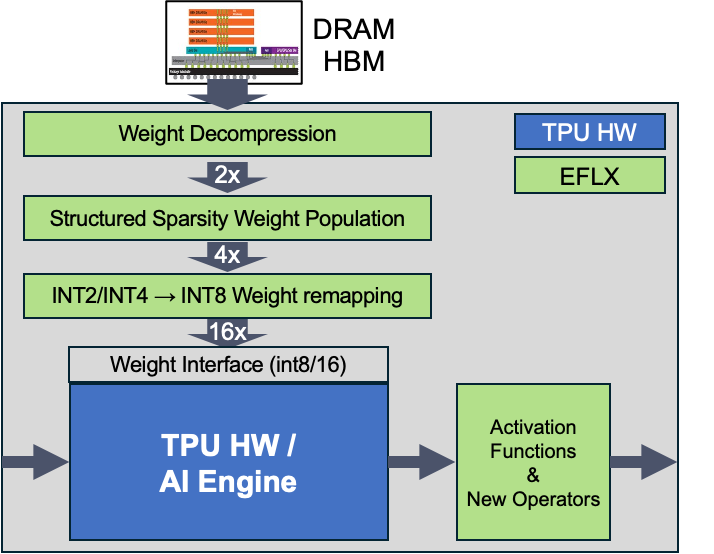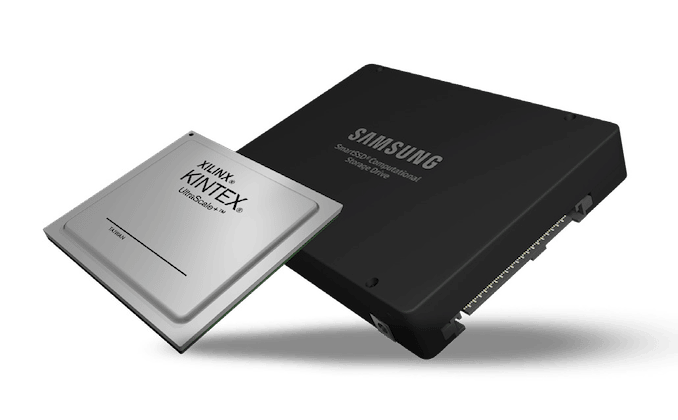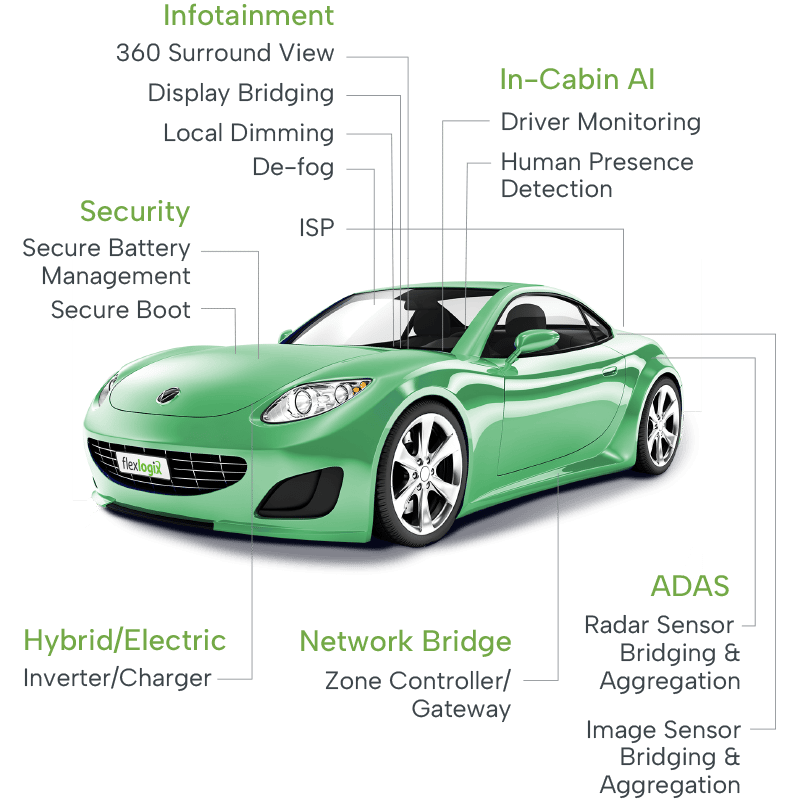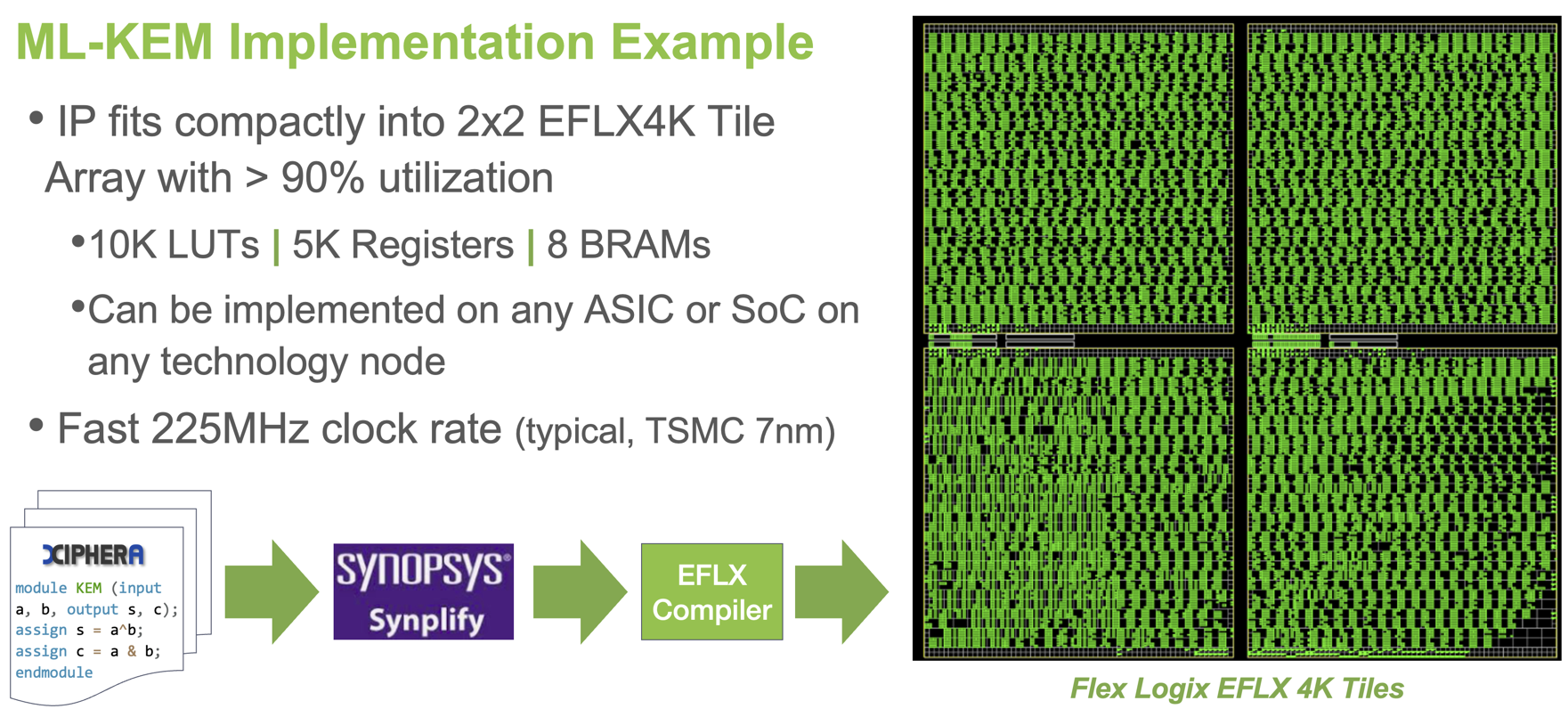Reconfigurable Use Cases & Markets
Crypto Agility
Systems and SoCs have to be able to adapt to shifting attacks and be ready for the post quantum era. Your SoC will be used by your customers for years and decades – if you can’t adapt your cryptography you can’t react to unforeseeable future attacks. You need your crypto to be agile using programmable logic. We can enable you to run solutions from providers like Xiphera, Instrinsic ID and Synopsys and be able to update cryptography in the field at any time. As an example, AES256 compiles into just 2 EFLX tiles and has streaming throughput of 2 Gigabits/second on N7 (worst case conditions, -40C to +125C, SS-FF).
Improved AI Accelerator Memory Bandwidth & Future Proofing
Large LLM and GenAI models are dominated by weights: 100B+!
Cost and performance are dominated by weight memory cost (HBM) – compute hardware is relatively cheap.
Memory-savings techniques is a very active field with many improvements and constantly evolving.
EFLX eFPGA enables hardware to adapt to these changing algorithms on the fly including future ones to get maximum memory savings.
Over 10x savings possible. And the mappings can be optimized by model.
Also, eFPGA can be used with a TPU/AI engine to efficiently execute new activation functions and operators that are developed after silicon tape-out – eFPGA can execute this much faster than a processor to extend the efficient life time of the AI Accelerator.

Microcontrollers and SoCs
Your customers often use external FPGAs in conjunction with your chips to interface to non-standard GPIO and to provide acceleration for workloads that benefit from FPGA’s parallelism.
Chip companies can now integrate eFPGA into your MCU or SoC so your customers can lower system cost, system size, and system power while continuing to enjoy the high performance and flexibility of FPGA – just now integrated into your SoC.
You can provide your customers with our software tools to program the eFPGA themselves.
Customers are in development now such as Alphawave.
InferX AI and DSP provide world class acceleration for your SoC.


Communications and Networking
Our customers in these spaces are integrating FPGAs that are adjacent to their SoCs.
5G wireless communications companies use FPGA to handle the radio head country-by-country and operator-by-operator customizations and to adapt to the continuingly evolving 5G standard in the field after the equipment is deployed. eFPGA can run as fast as the FPGA it replaces: for example 500MHz over the full process and temperature range for 7nm.
Customers are in development now such as Socionext.
InferX DSP provides very high throughput for signal processing with full reconfigurability – Your SoC can have the DSP performance of the fastest FPGA at a fraction of the power and cost.

Computational Storage
FPGAs are now being shipped with Smart SSDs to enable local processing of data to offload host processors.
With FPGA wear loading algorithms can be updated in the field, encryption algorithms can be upgraded as needed to stay ahead of hackers, and FPGA parallelism can process local data much faster than a remote host.
Now Smart SSDs can integrate eFPGA into their controllers to cut cost and power by 5-10x and cut size while keeping the full speed and flexibility of FPGA.

Automotive
Up to a dozen FPGAs are used in the most advanced automobiles for a wide range of applications from small to large.
Integrating FPGAs into SoCs in the automobile will cut power and cost by 5-10x and reduce size and weight.
Customers such as Morning Core (a subsidiary of Datung Telecommunications) are already deploying eFPGA in Automotive applications.
InferX DSP and AI can be used for radar, autonomous driving, cabin surveillance, backup and more. InferX can eliminate bulky FPGAs and GPUs and integrate them into companion SoCs saving money and power while keeping speed and flexibility.

Aerospace and Defense
FPGAs are used in every aerospace and defense application. US-manufactured eFPGA for SoCs reduce dependence on Taiwan.
Flex Logix eFPGA is in production on Sandia in Albuquerque and GlobalFoundries in NY, and is in development for TSMC’s new Arizona Fabs. eFPGA for other US fabs is planned.
Some of our eFPGA ports are Rad Hard by Design (RHBD).
Customers include AFRL, Boeing, the Department of Defense, Sandia and other government agencies and prime contractors.
InferX DSP and AI will be available on TSMC 5/4/3nm nodes manufactured in Arizona enabling world class DSP and AI made in the USA at a fraction of the size, power and cost of discrete DSP-FPGAs and GPUs.


Cloud Computing
In 2024 we will announce hardware and software advances that enable the integration of Millions of LUTs in advanced FinFet nodes (5nm and below).
This will enable Cloud Computing companies to integrate very large FPGA into their NiC, Networking, Security and Switch chips cutting power and cost by 5-10x and increasing compute density.

Robust ASIC Architectures
SoC designs often have complex state machines or custom controllers used to manage boot sequencing, subsystem configuration and communication to the rest of the SoC. For example, a controller for peripheral management of multiple peripheral, modes and settings operates in a single programmed mode once configured with registers eFPGA with hardened bitstream registers enables greater flexibility and enables registers to be re-wired to support new customer use cases or to fix bugs or new applications.

Other Applications
FPGA is used in all sorts of systems, so eFPGA will be deployed in a wide range of other systems as well such as “Micro FPGAs” (ForgeFPGA family from Renesas), mixed signal ICs with digital programmability, Financial Trading, Signal Processing, High Speed Test, Industrial Automation, Robotics and more.




